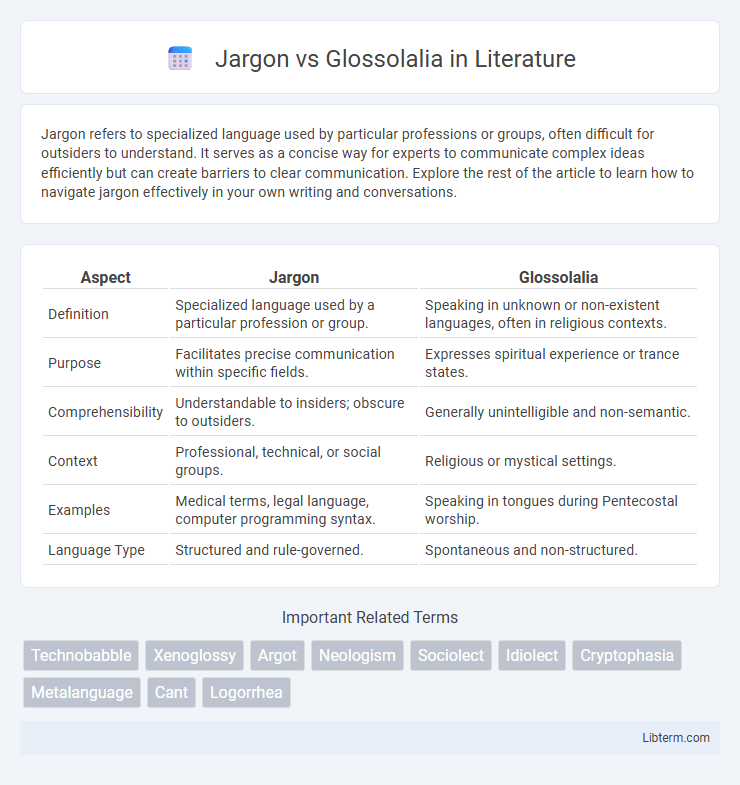Jargon refers to specialized language used by particular professions or groups, often difficult for outsiders to understand. It serves as a concise way for experts to communicate complex ideas efficiently but can create barriers to clear communication. Explore the rest of the article to learn how to navigate jargon effectively in your own writing and conversations.
Table of Comparison
| Aspect | Jargon | Glossolalia |
|---|---|---|
| Definition | Specialized language used by a particular profession or group. | Speaking in unknown or non-existent languages, often in religious contexts. |
| Purpose | Facilitates precise communication within specific fields. | Expresses spiritual experience or trance states. |
| Comprehensibility | Understandable to insiders; obscure to outsiders. | Generally unintelligible and non-semantic. |
| Context | Professional, technical, or social groups. | Religious or mystical settings. |
| Examples | Medical terms, legal language, computer programming syntax. | Speaking in tongues during Pentecostal worship. |
| Language Type | Structured and rule-governed. | Spontaneous and non-structured. |
Understanding Jargon: Language of the Experts
Jargon is a specialized language used by professionals within specific fields, designed to convey complex concepts efficiently and precisely. Unlike glossolalia, which consists of nonsensical or ecstatic speech without clear meaning, jargon serves a functional purpose in facilitating expert communication and knowledge sharing. Mastery of jargon enables individuals to integrate into expert communities and access advanced understanding.
What Is Glossolalia? Defining the Phenomenon
Glossolalia, commonly known as speaking in tongues, is a vocal phenomenon where individuals produce speech-like sounds without any recognizable semantic meaning or structured language. Unlike jargon, which consists of specialized terms used within specific professional or social groups to convey precise information, glossolalia involves spontaneous, often ecstatic utterances that lack consistent vocabulary or grammar. This phenomenon is frequently observed in religious contexts, serving as a form of spiritual expression rather than communicative language.
Origins and Contexts of Jargon Usage
Jargon originates from specialized groups or professions as a set of terms designed to facilitate precise and efficient communication within a particular field or community, such as medical or legal jargon. Glossolalia, often referred to as "speaking in tongues," emerges in religious or spiritual contexts as a non-semantic vocalization believed to convey divine messages or spiritual experiences. The purposeful development of jargon contrasts with the spontaneous and ecstatic nature of glossolalia, highlighting their distinct origins and contexts of use.
Glossolalia in Religious and Psychological Perspectives
Glossolalia, often referred to as "speaking in tongues," holds significant religious importance as a spiritual gift in Pentecostal and Charismatic Christian practices, symbolizing divine communication and spiritual empowerment. Psychologically, glossolalia is studied for its altered state of consciousness effects, with research indicating it may reduce stress and foster emotional expression by bypassing conventional language centers in the brain. Unlike jargon, which consists of specialized terminology within specific professional or social groups, glossolalia lacks semantic structure and is considered a vocalization motivated by religious experience or psychological phenomena rather than functional communication.
Purpose and Function: Why Jargon Matters
Jargon serves as a specialized language designed to facilitate precise and efficient communication within professional or technical communities, enhancing clarity and mutual understanding. It enables experts to convey complex concepts succinctly, supporting collaboration and knowledge transfer. In contrast, glossolalia--often referred to as speaking in tongues--lacks semantic content and functions primarily in religious or spiritual contexts to express emotion or invoke transcendence.
Communicative Challenges: Jargon vs Glossolalia
Jargon consists of specialized terminology used within specific professional or social groups, facilitating precise communication among insiders but often creating barriers for outsiders unfamiliar with the terms. Glossolalia, or speaking in tongues, involves producing unintelligible speech-like sounds that lack semantic meaning, presenting significant communicative challenges as the utterances do not convey interpretable messages to listeners. While jargon poses difficulties due to its exclusivity and complexity, glossolalia fundamentally challenges communication by bypassing conventional language structure and comprehension.
Social Impact: Inclusion and Exclusion in Language
Jargon creates social boundaries by enabling in-group communication among professionals or subcultures, often excluding outsiders and reinforcing group identity. Glossolalia, typically occurring in religious or spiritual contexts, fosters communal belonging and transcends conventional language barriers but may alienate those outside the faith community. Both forms influence social inclusion and exclusion, shaping group dynamics through specialized or non-standard linguistic codes.
Cognitive Processes Behind Jargon and Glossolalia
Jargon involves specialized vocabulary used within specific professional or social groups, relying on semantic memory and lexical retrieval to facilitate precise communication. Glossolalia, or speaking in tongues, engages altered states of consciousness where linguistic processing diverges from normal semantic and syntactic frameworks, often involving spontaneous and non-semantic vocalizations. Cognitive processes behind jargon emphasize learned associations and meaning-making, whereas glossolalia reflects neural mechanisms linked to emotion, trance states, and reduced executive control.
Misconceptions and Confusion: Clearing the Vocabulary
Jargon and glossolalia are often confused due to their complex linguistic appearances, but they represent distinct phenomena; jargon consists of specialized terms within a particular profession or group, facilitating precise communication among experts. Glossolalia, or "speaking in tongues," involves vocalizing fluid, speech-like sounds without coherent semantic meaning, commonly found in religious contexts. Clarifying these differences dispels misconceptions, ensuring jargon is recognized as functional language and glossolalia as expressive, non-semantic utterance.
Comparing Jargon and Glossolalia: Key Differences
Jargon consists of specialized language used by particular professional or social groups to facilitate precise communication, whereas glossolalia involves speaking in unintelligible, often ecstatic vocalizations with no recognizable linguistic structure. Jargon is purpose-driven, enabling clarity and efficiency within specific domains, while glossolalia is typically spontaneous, expressing emotional or spiritual experiences without semantic meaning. Understanding these differences highlights jargon's role in practical comprehension versus glossolalia's function as a form of non-semantic vocal expression.
Jargon Infographic

 libterm.com
libterm.com